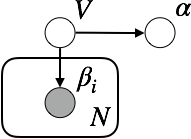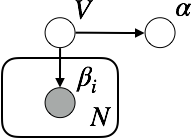Recent success of Bayesian methods in neuroscience and artificial intelligence gives rise to the hypothesis that the brain is a Bayesian machine. Since logic, as the laws of thought, is a product and practice of the human brain, it leads to another hypothesis that there is a Bayesian algorithm and data-structure for logical reasoning. In this paper, we give a Bayesian account of entailment and characterize its abstract inferential properties. The Bayesian entailment is shown to be a monotonic consequence relation in an extreme case. In general, it is a sort of non-monotonic consequence relation without Cautious monotony or Cut. The preferential entailment, which is a representative non-monotonic consequence relation, is shown to be maximum a posteriori entailment, which is an approximation of the Bayesian entailment. We finally discuss merits of our proposals in terms of encoding preferences on defaults, handling change and contradiction, and modeling human entailment.
翻译:贝叶斯人最近在神经科学和人工智能方面成功的方法引出了一种假设,即大脑是贝叶斯人机器。由于逻辑,作为思想定律,逻辑是人类大脑的产物和实践,它导致另一种假设,即存在一种贝叶斯算法和数据结构来进行逻辑推理。在本文中,我们给出了巴伊斯人的推论,并描述其抽象的推论属性。在极端的情况下,巴伊斯人的推论被证明是一种单一的结果。一般而言,这是一种非单调后果关系,没有显性单调或切特。 优先要求是代表非运动后果关系,被证明是后遗症的最大要求,是巴伊斯人的推论。我们最后讨论了我们在默认、处理变化和矛盾以及模拟人的推论方面的建议的优点。








